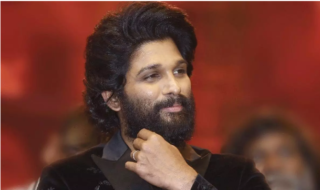
Allu Arjun, fondly called “Icon Star” by his fans, has emerged as a force to be reckoned with in Indian cinema. His recent blockbuster “Pushpa: The Rise” shattered regional barriers, captivating audiences nationwide and propelling him to pan-Indian stardom. Interestingly, unlike his contemporaries who ventured into Hindi cinema after achieving similar success, Arjun is taking a distinct approach.
While “Pushpa” received mixed reviews in Telugu states, it resonated deeply with North Indian audiences. Arjun’s captivating performance, characterized by distinct mannerisms, powerful attitude, and impactful dialogues, struck a chord with viewers across the country. This success even garnered him a prestigious National Award, solidifying his position as a pan-Indian hero.
Traditionally, actors achieving pan-Indian fame often gravitate towards Bollywood projects or collaborations with Hindi directors. Ram Charan’s foray into Hindi cinema with “Zanjeer” after the phenomenal success of “Magadheera” serves as a cautionary tale, highlighting the challenges of navigating a new industry. Similarly, NTR Jr. is currently filming “War 2” alongside Bollywood superstar Hrithik Roshan, directed by Ayan Mukherji.
However, Arjun seems unfazed by the conventional Bollywood route. Reports suggest that he politely declined lucrative offers from prominent Hindi directors, including the esteemed Sanjay Leela Bhansali, following “Pushpa.” This decision appears to be strategically driven by Arjun’s belief in the power of Telugu cinema to impress audiences nationwide.
Arjun’s strategy revolves around delivering Telugu films that resonate with pan-Indian sensibilities. He reportedly believes that achieving success with a Telugu cast and crew, creating a universally acclaimed project, is a more sustainable approach than directly entering the Hindi film market. This philosophy aligns with his long-standing popularity in Malayalam cinema, where he has consistently impressed audiences despite not starring in Malayalam-language films.
Arjun’s calculated approach stands in contrast to several Telugu actors who ventured into Bollywood and faced setbacks. Prabhas’s experience serves as a prime example. By prioritizing impactful Telugu films with pan-Indian appeal, Arjun appears to be charting a unique course to sustained success in the ever-evolving landscape of Indian cinema.





